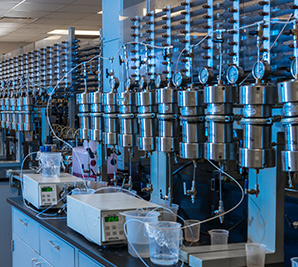Reservoir Conditions Capillary Pressure & Resistivity System, RCCP-301
The system provides critical reservoir description data at reservoir temperature, pore pressure and confining stress. The system is configured to provide steady state porous plate capillary pressure data and simultaneous electrical properties (“F”, “RI”, “Sw”, “m”, “n”, “Ro”, “Rt”) data with reservoir fluids.
The capability to determine Rw at test conditions is also included in the system, which also incorporates the latest benefits of Core Labs client focussed R&D program. The system is rated to 10,000 psig confining pressure, 9,500 psig pore pressure at a temperature of 150 °C and features automated data acquisition and semi-automated operation. Data calculation and report software are included.
Summary of Operation:
(Restored State). Plug samples of known porosity and permeability are saturated with simulated formation brine, the Rw of the brine determined at reservoir temperature and pressure in the Reservoir Conditions Brine Resistivity Cell. The core plugs and downstream water wet (hydrophilic) ceramic plates are saturated with the brine, wetting phase, and placed in the core holder. Unconsolidated samples are mounted, frozen, in Teflon sleeves incorporating two electrical terminals. The sample and plates are then subjected to brine flow through at confining pressure and test backpressure to ensure 100 percent brine saturation. Saturation is confirmed by measuring a reproducible Ro on the sample at test conditions. The upstream pump cylinder injects the displacing phase (oil) at constant pressure whilst the down stream pump cylinder maintains the differential pressure across the porous plate and collects the effluent wetting phase (brine) from the core holder providing accurate fluid measurement that is logged by the host computer along with all experimental parameters. Electrical measurements can be made in both four and two electrode modes and at either fixed frequency or a frequency scanned to produce a minimum phase angle. The experimental data for each sample are logged to hard in the host computer and used in the report generation software for final report generation. Newly developed proprietary PcMax plates allow pore entry pressures of up to 1,500 psig to be obtained allowing, for the first time, analysis of very low permeability samples by this method.

